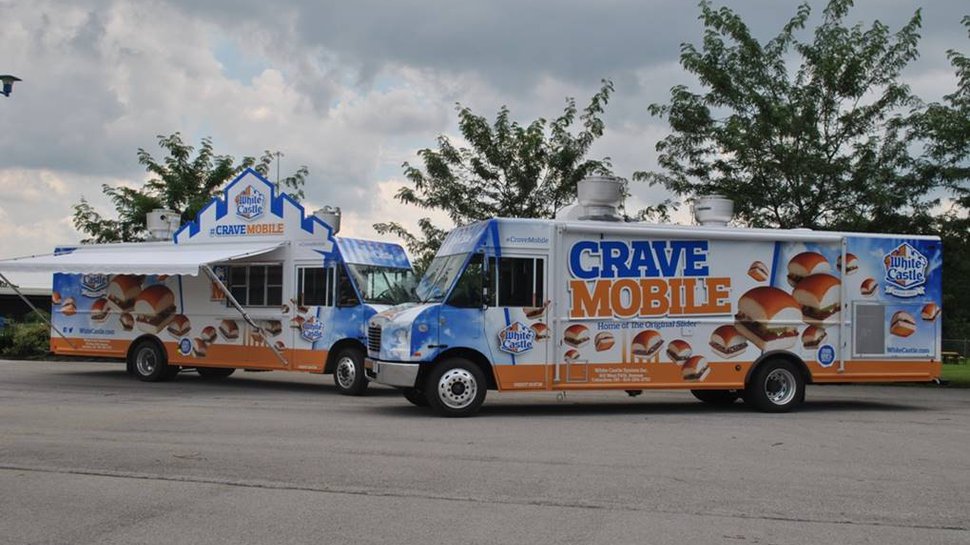Photo courtesy of White Castle.
White Castle, one of the nation’s oldest QSRs, isn’t missing a beat in tapping new and better ways to serve customers and bolster its iconic brand. Famous for its 100 percent beef patty with onions and pickles, the company’s two “Crave Mobile” food trucks have been serving the signature “sliders” to customers since 2013.
Steve Foreman, operations services manager for the Columbus, Ohio-based company, was part of the team that created the Crave Mobiles, the two diesel-powered, 10- by 32-foot vans that serve a limited White Castle menu to markets nationwide.
Supporting the company brand
“It was a good opportunity to take the brand to places that we didn’t have restaurants,” Foreman told Food Truck Operator. “Our mission is to create memorable moments, and we felt the food truck would be the perfect opportunity to visit some of our long-time local ‘cravers’ in some places that we don’t have restaurants.”
The kitchen area inside the truck was designed to be similar to that of a regular White Castle restaurant. The trucks have freezers, grills, fryers and refrigerators – the same equipment as in the restaurants.
One goal is to serve markets where there are no brick and mortar restaurants.
“It’s a really great tool to build the brand and the customer relationship in a totally different setting than you would running a marketing campaign or opening up a 24-hour brick-and-mortar restaurant,” Foreman said.
“We get the opportunity to step in there and just bring out some original sliders; it just adds to their experience,” he said. “That has been the best thing that it does for the company.”
The company’s corporate marketing and leadership team coordinates the use of trucks for each region.
Workers from local restaurants work on the trucks alongside corporate team members. There are usually two or three people working on a truck, but there can be as many as five for big events.
Boosting employee morale
The company has gotten a lot of support form team members in regions when the trucks travel to special events. Based in Columbus and Louisville, the trucks travel to all markets and participate in a range of events – NASCAR, the Florida State Fair, charity events, football tailgating parties and the Virginia Beach boardwalk.
The trucks, run as a separate profit center, don’t serve the full White Castle menu. When serving big events like NASCAR, they focus on a few sandwiches and French fries.
“We can manage the entire menu, but we don’t like to go over five or six (items) per event,” Foreman said. “It gets to be a challenge with storage and production.”
Truck activity has increased over the last three years.
“We’re starting to find many good opportunities that fit within the truck’s ability,” Foreman said. Supporting new product launches and limited time offers are good examples.
“It opens up unique opportunities that provide some feedback,” he said. Sometimes the response is better than expected.
“As it gets more noticed around the areas where it’s based, Louisville and Columbus, you get a lot more requests locally,” but not nationally, he said.
Operational challenges
Getting permits from government entities can be hard.
“Each municipality has a different procedure to go through,” Foreman said. “The biggest challenge is to figure out how to get the permit. Once you figure out that, it’s never been an issue.”
Department of Transportation regulations can be an issue. All truck drivers are required to follow DOT regulations for long haul trucking. Federal “hours of service” regulations that restrict the number of hours a driver can work are challenging for the company.
The company has no plans to add more trucks at the present time, but Foreman said this could change.
“We believe they are an excellent representation of the brand, and they are very successful at that,” Foreman said.
by Elliot Maras

